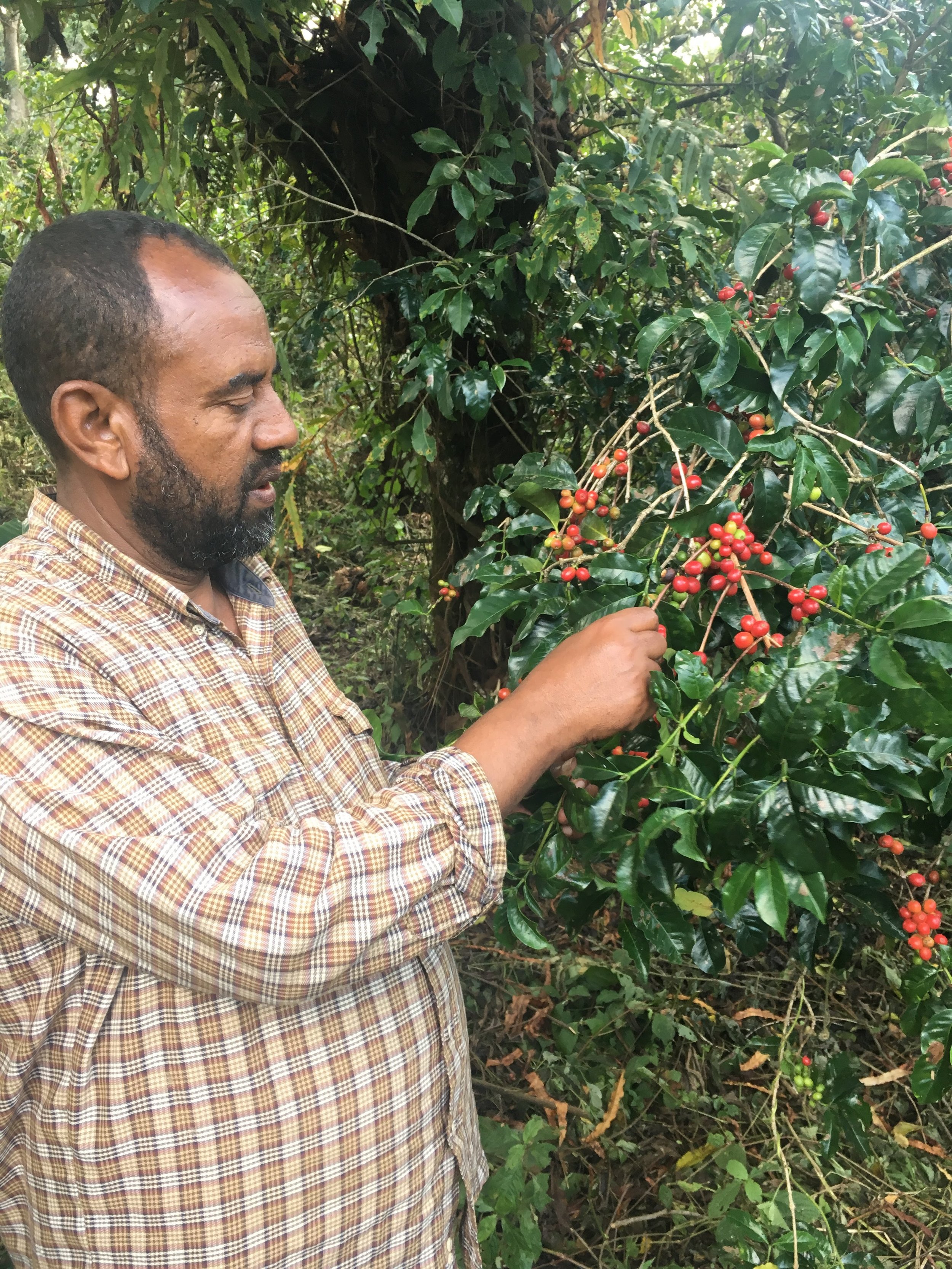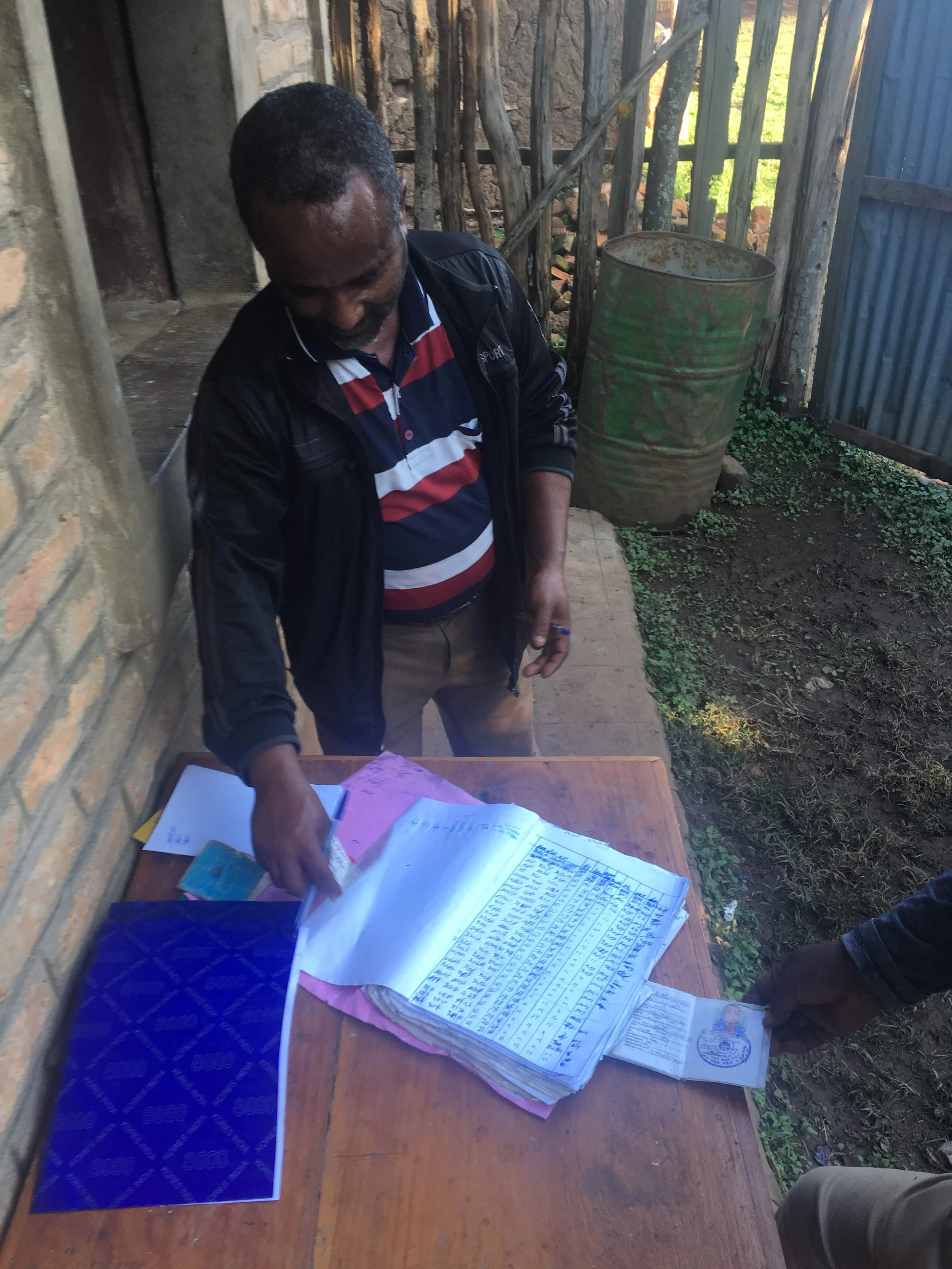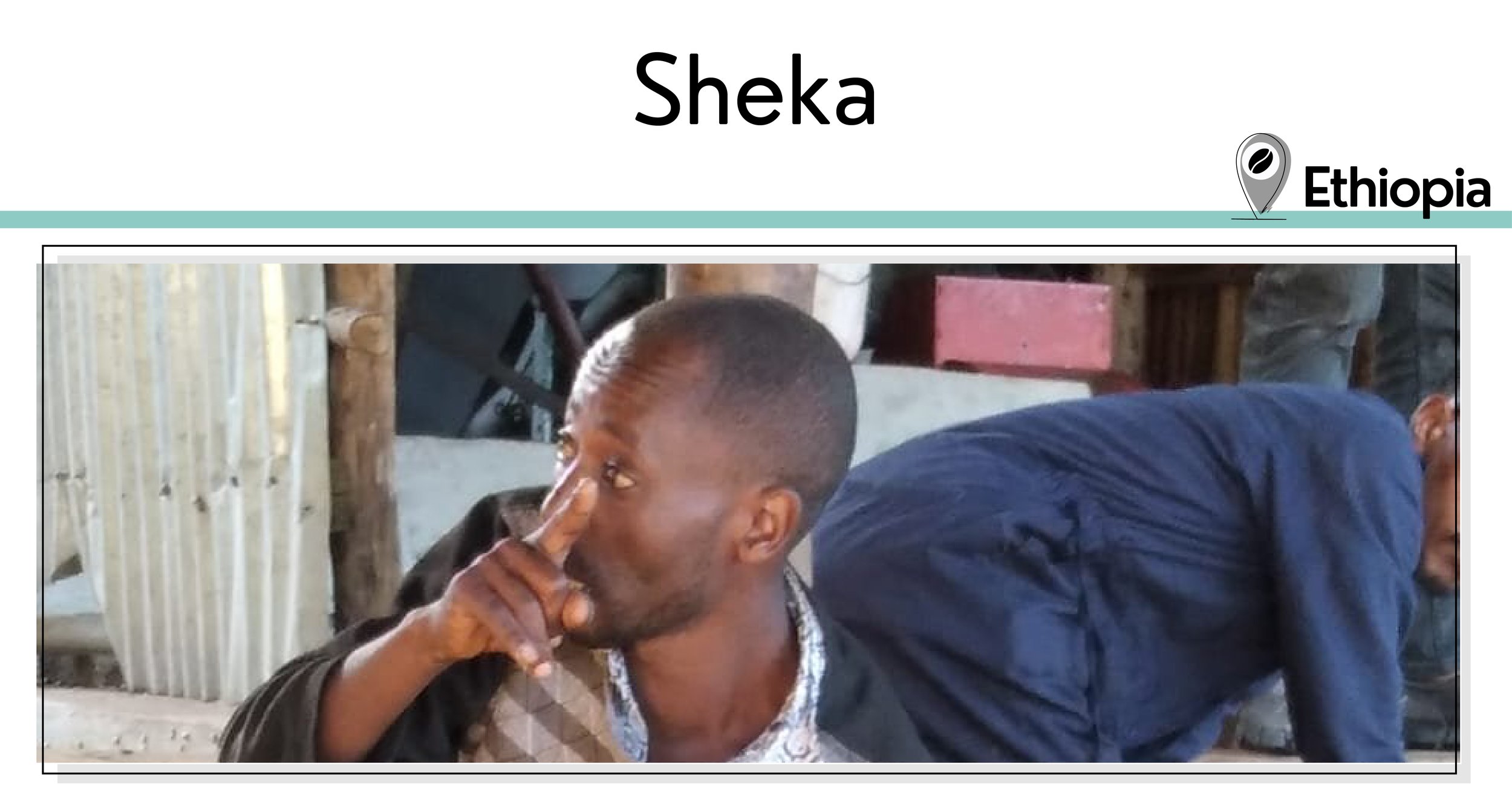The foreigner who brought back native coffee
When Gidhe Berhe created Limmu Kossa in 2000, he did so with the vision of contributing something to the region. He knew coffee could offer great opportunities, but he understood that he was a foreigner from a different part of Ethiopia coming to a land of proud and independent Oromo people. Gidhe didn’t just care for the native trees and nourish the soil in a regenerative paradise, but developed a micro-economy in the region that benefited everyone. Gideh provided seedlings and assistance to surrounding farmers and developed the community projects villagers asked for: a church, schools, medical centers, even roads.
Enter Abiy. Translator, development agent, Dutch resident but with local Oromo roots… He became interested in coffee, and in this particular project, in 2004 when he met Gidhe. Our Ethiopia project is founded in full on the harmony between Abiy and Gidhe. If Gidhe is the local leader, Abiy is the ambassador. Without Gidhe, there would be no island of hope in the region; without Abiy, nobody here would know about it...
Today, Limmu Kossa's efforts have spread to another region: The Sheka Forest Biosphere Reserve, one of the most sustainable coffee projects we've encountered. Additionally, neighbours are now taking their coffee quality to the next level, exporting to the international market for the first time through us.
-
This was the first large estate This Side Up worked with, and it took some mental adjustment to make this decision. When in 2013 we founded our company, we saw ourselves as the agent for farmers who do not have easy access to the international specialty market. So, at least in Africa, we always tried to work with farmer cooperatives directly. Although these coops can be less efficient managerially, if run well, they develop according to the combined will of their member farmers. In Congo and Tanzania, and in Rwanda especially, we have seen only farmer-driven upgrades in the last four years, with no monitoring or lack of motivation - simply because of the democratic dynamics of the cooperative structure. For this reason, private estates were never really on our radar - they’re established enough and will easily find buyers without our help, was our reasoning.
That was until Sara convinced Lennart to listen to Giday’s, and his company Limu Kossa, story. Sure they had an established business with state of the art equipment, and sure they had sold to specialty importers before - but appearances seldom tell the whole story.
In a country where farmer cooperatives have only been granted permission to export independently since March 2017, the demands of the specialty coffee industry are still relatively unknown— unlike the coops we work with in our other African origins. For This Side Up, working with them with limited resources would be very risky. ARC Youth Ambassador and former Technoserve consultant from Ethiopia, Fitsum Bekere Ligdi, told us: “Most coops are not well managed and every [smallholder] farmer produces their coffee in a different way, so to make it conform to speciality standards, it needs more effort. But with a single farm, you only need the commitment of the owner.”
Fitsum immediately added: “the only problem with single farms is they tend not to allocate the premium price efficiently for the main purpose”. His experience with Technoserve showed estates too could do much more to upgrade their processing, support surrounding farmers and become ecologically sustainable.
One might add that in Ethiopia, there is a bit of a resource curse. Because the intrinsic (genetic) coffee quality is higher than literally anywhere else on Earth, processing standardisation has not been a priority nearly as much as in countries like Nicaragua or Rwanda - where our partners time every process to the minute to create specialty coffee. In Ethiopia, most farmers produce an 85+ coffee regardless of their attention to detail. Processing mistakes (or even lack of traceability and social justice) are forgiven easily - simply because the coffee is so damn good - and therefore buyers will come anyway. Of course, most of these buyers are not loyal and will easily switch if for any reason the coffee from one region is better than the other - one of the reasons that coffee farming, even in the best naturally endowed country in the world, is still risky and left to the country's poorest.
So what to do? In a nutshell, coops are inexperienced and don’t deliver consistent quality and estates can’t be trusted to spend premiums fairly. When Sara introduced Lennart to Abiy and Limu Kossa at the World of Coffee in Budapest, she knew that he might hold the answer.
The best of both worlds: Limu Kossa in Galeh
Limu Kossa was founded by Giday Berhe, who started his coffee career as a trader in 1993 in Jimma. He then opened a wet and dry mill station with the aim to supply the central coffee market with quality coffee. In the early 2000s, he decided to establish his own farm in the village of Galeh in Jimma and from the outset establish meaningful relationships with neighbouring smallholder producers. Not only does he spend much of his profit on health care and schooling for the community, he actively teaches the farmers to upgrade their farms and techniques to eventually be able to process and export their coffee for high premiums as well.
Here was the hybrid we were looking for, a private estate with the heart of a producer cooperative. His commitment to produce quality coffee while at the same time supporting his local community has even granted him the title of "Abba Ollie" or “he who uplifts”. It then dawned on us that we had heard similar titles for some of our other parters: Limu Kossa in fact resembles the structures we’re developing in Colombia and Nicaragua. All are private and well-organised support, milling and export entities that exist to uplift the lives of smallholder farmers.
In the end, to cut a very long story short, it turned out we did not have to sacrifice any of our ideals by working with Limu Kossa - and better still, are simply continuing a development path that we have been on in other countries for several years. More exciting still, we have the chance to link the fates of all these local "Abba Ollies" by encouraging exchange between them.
Limmu Kossa and Us
Limu Kossa is an established played in Jimma and known for both quality and commitment to social programs to improve livelihoods in the community. However, they have been struggling with marketing their coffee consistently to specialty buyers. Like us, they were looking for a partner who is willing to support them in their long-term plans to establish links with surrounding farmers and to allow them to export their coffee too. Through our work with Expocamo in Nicaragua and Argote in Colombia, we have the experience to set up such programs - but more exciting still, we can link Giday to these partners directly and provide very effective network support.
In 2017 we purchased our first pilot shipment of 35 bags in stock, and when we noticed that halfway through the season the coffee was still as bright, floral and cherry-sweet as ever— we where not surprised by the overwhelmingly positive responses. For next season, Gidhe and Abiy set up six microplots according to microclimate, soil and altitude, and planned a mini auction for the best of the harvest.
Later on, in 2018, when Lennart visited the Limmu Kossa Estate they finished the microregion lot program (divided into Betella, Suki and Suromo - parts of the form), met the three first outgrowers whose coffee we will separate and offer as distinct lots from now on. They also created a cascara protocol and fine-tuned the natural drying process. The level of professionalism with which the farm is set up and maintained from an agro-forestry point of view became evident to us. It was also quite evident that the respect the locals have for Abba Ollie (which we have been writing about for two years but never experienced first hand!) goes deep: the kind of community cooperation model we aim to see grow: people flock to the estate for work not just for the higher prices they receive, but for the good working and temporary living conditions at the farm. Lastly and most excitingly, on that trip, we made plans to create an on-site cupping lab, maintained by local teens who will receive sponsored Q-grading training.
In 2020, Gideh’s efforts expanded to a quite a different region in Ethiopia: Sheka, located in the southwest highlights, about 370 kilometers from Jimma, located in the Sheka Forest Biosphere Reserve, one of the few in the world protected by the UN. This reserve includes forests, bamboo thickets, wetlands, agricultural land, rural settlements, and towns. It covers a unique biogeographic unit extending from cold and very wet highlands to hot lowland areas. Added to this, the firs international export of Sultan Bawari was accomplished with success.
These are the estates and community that provide our 2024 season import.
Limmu Kossa has been actively inspiring farmers for more than 20 years. In 2023 they purchased 420 hectares of land in another region: Sheka. Besides this, we offer coffee from Sultan Bawari, who we met in 2018 and who is now exporting his coffee through us.
Traceability
You can find all the signed contracts and shipping documents that we made with Limmu Kossa since 2021 below (Google Drive).
2017: partnership born, first microlot created for This Side Up, plans to export surrounding farmer lots established for next season.
2018: naturals and washed lots of our Galeh microlot imported. Giday Berhe visited This Side Up on his second ever trip to Europe for the Producer Crossover and to create a thorough outgrower training program.
2019: created an Ethiopian first: a single farmer lot by one of the farm’s trusted outgrowers, Sultan Ba’wari. Imported both Grade 1 and Grade 4 estate lots - the latter serves as one of our prime “base blends”.
2021-2021: our steady growth allowed us to increase our demand to 195 bags with great results. In Limmu Kossa, a 12 km road was built. This improved access to the farm and nearby outgrows, in addition to facilitating social mobility and access to nearby health centers.
2022: we almost doubled our volume, with 347 bags of both natural and washed. 25 hectares of old coffee trees were pruned.
2023: our Ethiopian portfolio strengthens with the introduction of three new micro-region lots from Galeh: Suki, Sinsino and Betella), and the first international export from Gidhe's new estate located in the Sheka Forest Biosphere Reserve. Added to this, the construction of a four room elementary school started.
2024: Establishment of Abba Ollie import company by Gidhe and This Side Up into the Netherlands. Wholly owned by Gidhe, this will allow more independence and easier financing of stock for both us and them in the future. A major step, and a TSU first!
Our QC’s Flavour impressions
This season, the washed lots reached new heights. We can now truly say that Limmu Kossa’s microlots are of the highest Ethiopian standards. If Galeh is the elegant floral sister, Sheka is the bold fruity brother. As for the naturals, there are still quakers this year, but fewer. With so few pickers in the late season, we have come to learn it is almost impossible to avoid. Still, this mainly messes with the visuals, not the thick, syrupy flavours of the coffee. The grade 4 community lots are also not the prettiest to see, but make for amazing and outspoken coffees that add great acidity and pizzazz to any house blend.
Galeh 2024 - washed Grade 1
Recommended Ikawa profile
We found that to make this Ethiopian explode in flavour, we had to create our own Ethiopia profiles, both for washed and naturals. Great balance between florals, fruity acidity and the syrupy undertones.
Limu Kossa's owner is Gidhe, an inspiring man who built an independently exporting estate from scratch. His friend and representative, Abiy Ashenafi, lives in the Netherlands and is fluent in Dutch and English. They are your main contacts for any questions about our Galeh and Sheka projects.
Gidey Berhe Retta
Email: limmukossa1@gmail.com
Phone: +251 917 550 244
Abiy Ashenafi
Email: abiy.ashenafi@gmail.com
Phone: +31 6 2845 3571
Limu Kossa, Jimma Zone, Oromia Region, Ethiopia
PHOTO GALLERY
These pictures were taken by us, by Antoine and by visitors over the course of many years.
You may use them freely to promote Rushashi among your customers.
















































